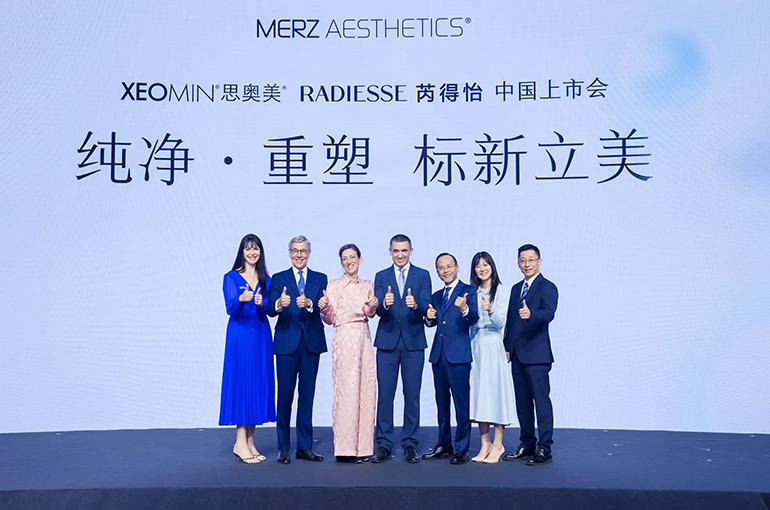 Germany's Merz Launches Two Premium Regenerative Aesthetic Injectables in China as Local Demand Rises
Germany's Merz Launches Two Premium Regenerative Aesthetic Injectables in China as Local Demand Rises(Yicai) Nov. 26 -- Merz Aesthetics has released two of its flagship injectables in China, expanding the German company's presence in the Chinese market that is rapidly shifting toward regenerative aesthetic treatments while tightening oversight of injectable materials.
Releasing Xeomin and Radiesse in China is part of a generational commitment rather than a pursuit of immediate returns, executives from Frankfurt-based Merz said during a launch event in Shanghai on Nov. 21.
Xeomin, a botulinum toxin type A indicated for moderate to severe glabellar lines, was approved in China in February last year. It is formulated without complexing proteins or biological impurities, which reduces the risk of developing neutralizing antibodies linked to treatment resistance, according to Merz.
"We look beyond short-term targets," noted Christian Baatz, managing director of Merz Family Holding. "We don't measure success in quarters, but in generations," he said, emphasizing the firm's 117-year history.
Radiesse, approved to enter China's growing biostimulator market in March, is a calcium hydroxylapatite filler cleared for subdermal implantation to correct nasolabial folds. The injectable forms a scaffold that activates fibroblasts to produce collagen, elastin, and other extracellular matrix components, providing structural support and longer-term tissue regeneration.
"The core mechanism of Radiesse lies in its dual characteristics of 'non-inflammatory activation' and 'ECM reconstruction,'" said Wu Yan, vice president of the China Society of Minimally Invasive Aesthetic Plastic Surgery and Dermatology. "Its release promotes alignment of China's regenerative aesthetic medicine with global standards."
Rising Consumer Interest, Regulatory Scrutiny
Interest in CaHA products has surged among Chinese consumers, with 87 percent of them in major cities expressing willingness to try biostimulators, according to the findings of an Ipsos survey commissioned by Merz.
Injectable CaHA accounts for about 7 percent of the global dermal filler market, while hyaluronic acid has a 77 percent share, according to data from South Korean cosmetics supplier Pharmocean.
However, CaHA products' premium pricing, often exceeding CNY10,000 (USD1,410) per syringe, has fueled alarming practices at some clinics, including off-label use and product misrepresentation. According to the Medical Aesthetics Dispute Research and Mediation Center, around 200 CaHA products have received approval in China, but most are designated for orthopedic or dental applications and not facial aesthetics.
Only Radiesse and Shanghai Moyang Biotechnology's Aphranel have regulatory clearance specifically for facial injection in China, Yicai learned. CaHA products approved for other medical purposes may differ in particle size, structure, and biocompatibility requirements.
"Facial injection of CaHA products demands highly skilled physicians who have received specialized training," said Zhang Jie, director of Shanghai Zhaoheyan Medical Beauty. "Incorrect injection sites or depths may fail to achieve expected results or even cause embolism, with no effective remedial measures available."
"We must adhere to the 'small amounts, multiple sessions' principle to avoid overtreatment," Wu pointed out.
Merz's Commitment to China
Merz Aesthetics, the world's largest dedicated medical aesthetics firm, sees China as a critical growth market, according to the company. It assembled senior executives from its global, Asia-Pacific, and country operations for the Shanghai launch event.
"China is a key strategic market for our global business, and this launch event marks a milestone in our journey," said Lawrence Siow, president of Merz Aesthetics Asia-Pacific branch.
"Through professional education and cultivating informed consumer perceptions, we are dedicated to working alongside industry leaders to drive innovation and sustainable growth in China's medical aesthetics sector," noted William Cui, general manager of Merz Aesthetics' country arm.
Merz allocates 7 percent of its annual revenue to research and development, maintaining a global team of over 250 specialists with 30 active projects in the pipeline and 15 new regulatory approvals planned over the next five years. It operates three in-house R&D facilities supporting innovation from early-stage development through clinical validation.
Editor: Martin Kadiev